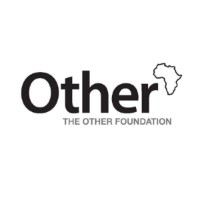Condragulations: About 40 people from around the Western Cape nervously flapped in the dressing room over eyelashes, wigs and sequinned outfits but once on the stage they calmly strutted their stuff. Photo: David Harrison
The oiled-up Tyler William strutting the stage of Athlone’s iconic Joseph Stone Auditorium in neon green and bright blue swimwear is whiplash-inducingly different from the person I interviewed less than an hour earlier.
Then, in the auditorium parking lot and dressed in plain T-shirt, burgundy shorts and flip-flops, William spoke about how, for most of his life, he had been “antidrag”.
Now living in Mitchell’s Plain, the Durban-born William says: “In Indian culture, [being gay] is forbidden or feels like something bad.”
As a result, he spent most of his life in the closet. It was only after meeting his partner, Skyler Barrymore, that his views on being gay, and on drag in particular, changed.
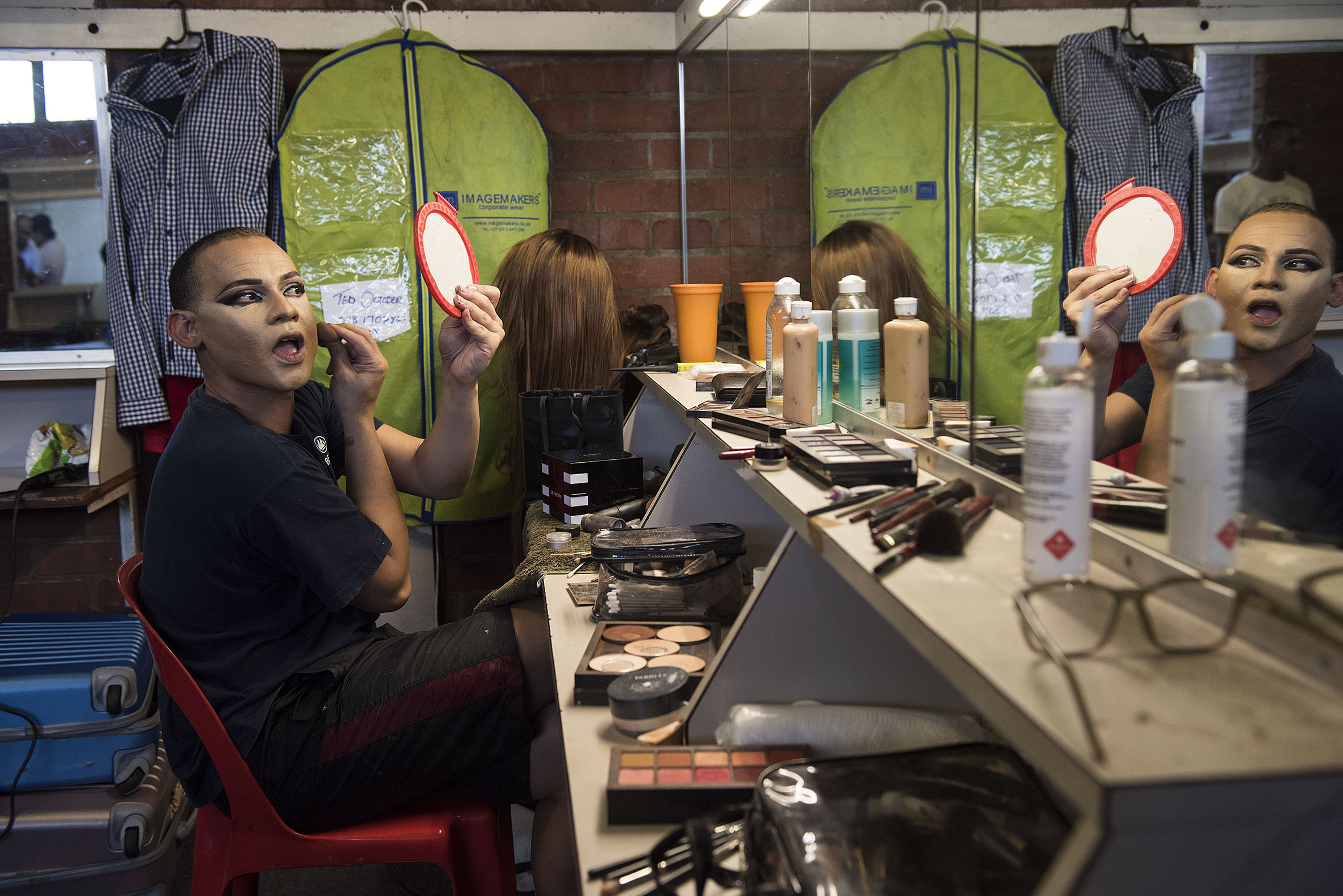
Skyler Barrymore introduced her partner to the world of drag. Photo: David Harrison
“I never knew she [Skyler] dragged. After about two years of us dating, I found stuff, like clothes and stuff and some pictures of her, and I put two and two together. I didn’t confront her about it. I waited another six months for her to tell me herself,” he says.
The pair eventually relocated to Cape Town because, he says, “with Skyler being a drag queen in Durban, she wasn’t really feeling herself there. The community was accepting but it was an old community. We came to Cape Town and our lives have been better. Everyone accepts you for who you are.”
Skyler’s popularity as a drag queen has played such a significant part in the couple’s new-found sense of place that Tyler has also started to enter pageants, albeit in the “Mr” category. The two were among nearly 40 entrants in this year’s Mr & Ms Cape Town Pride who, like Tyler and Skyler, take months out of their lives — and wads of cash from their pockets — in the hopes of winning the title.
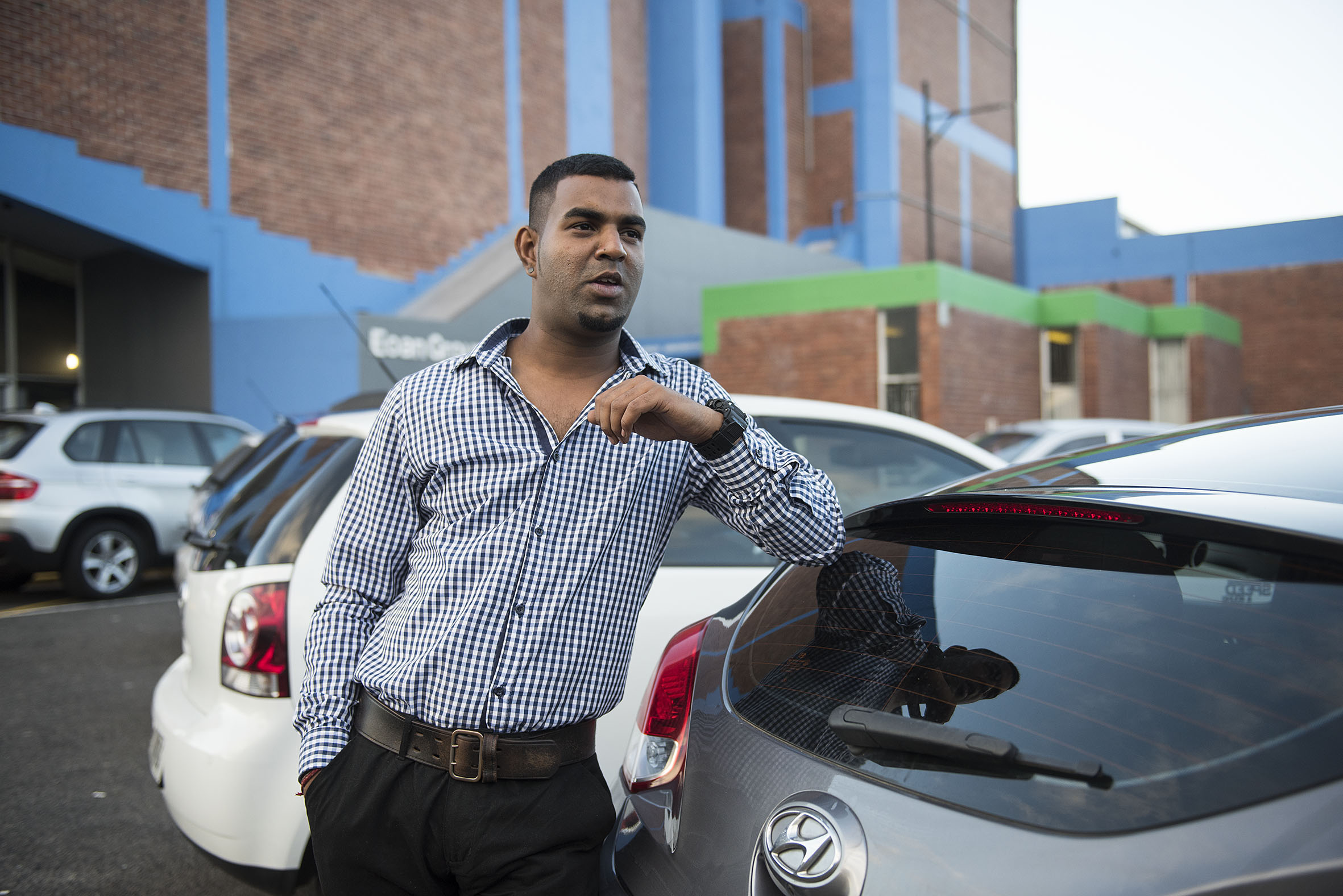
Drag has given Tyler William and his partner sense of place. Photo: David Harrison
“It’s lots of stress. You gotta go for fittings, you gotta know what looks you are going for, especially if there are themes, gotta do research and know your Q&As, so you have to be clued up with what is happening in the world. Gotta work on your ramp. In total, I would say it cost us, together, plus-minus R25 000. On clothes, make-up, fuel … all those things.”
The months of preparation have culminated in entrants from across the Western Cape clamouring for space in the tiny, packed backstage dressing room. Filled from the worn carpets to the ceiling with highly flammable everything — sequined dresses, wigs, nervous temperaments — the room flits between the contestants’ panic (“Waar’s Destiny? Is Destiny al hier?”) and generous dispensing of advice (“Dis fokken warm, jy kannie met shoulder pads loop ’ie [It’s fuckin’ hot, you can’t walk with shoulder pads”] to the focused, nervous silence unique to those consumed by both nerves and a dogged determination to win.
Surrounded by faffing femmes furiously fanning themselves, futilely trying to fend off the heat, Tyler carefully applies Skyler’s eyelashes. “I help her do her hair, her nails … What a husband would do for his wife, basically,” says Tyler.
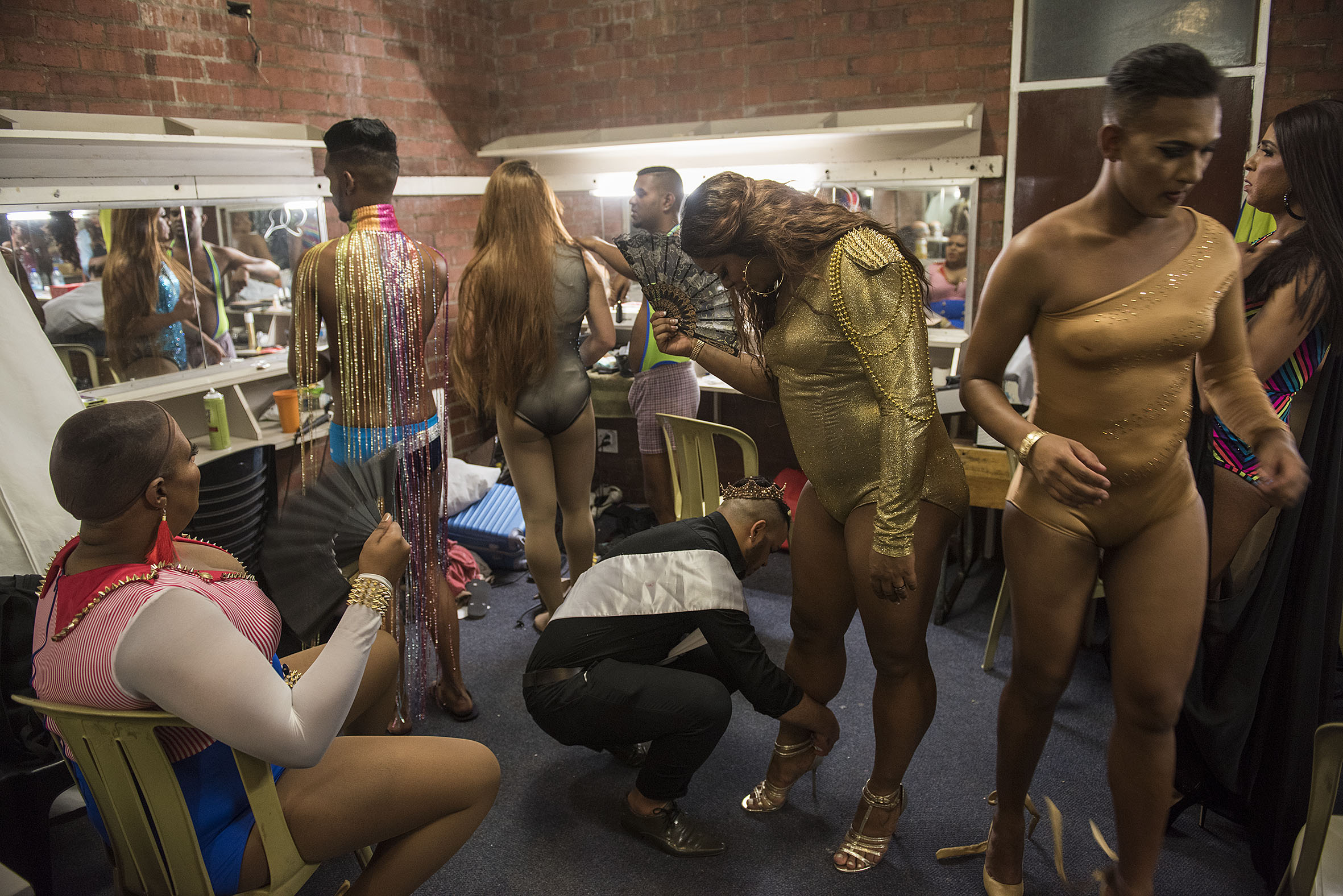
Inside the packed dressing room where contestants prepare to dazzle the audience and judges. Photo: David Harrison
Skyler, with an exterior so calm it could come across as aloof were it not for the occasional smile, says, although she has been dragging for “about four years now, I wasn’t really into it until I did Miss Gay Western Cape about two years ago. That was where I discovered my potential. I embarked on a journey to discover myself in drag.
“Pageants are a platform to create awareness in our communities to say that drag is not just what people perceive it to be. There’s beauty behind it. When I’m on stage, I’m in my element.”
In the 2017 report, Dragging Rights, Queering Publics: Realness, Self-fashioning and the Miss Gay Western Cape Pageant, Bryce Lease argues that the aim of the Miss Gay Western Cape pageant “is to provide a platform for queers of colour to perform in a secure environment without exploitation, [and] entails a number of complex movements: across the urban landscape, between poorer peripheral suburbs (Cape Flats, Atlantis) and the predominantly white city centre”.
In a corner of the bustling dressing room, Paris Faithful — or Kurt Johannes, as her mother named her — takes needle and thread to the leopard-print swimming costume she will be wearing for the swimwear leg of the competition. “I’m busy fixing my tits,” she laughs, shyly.
Paris is one of those who have crossed the urban landscape to enter this year’s Ms Cape Town Pride competition. From Mamre, a town “about an hour and a half away from Cape Town, when there’s no traffic”, the 22-year-old says that since entering pageants she has gained acceptance among those in her community.
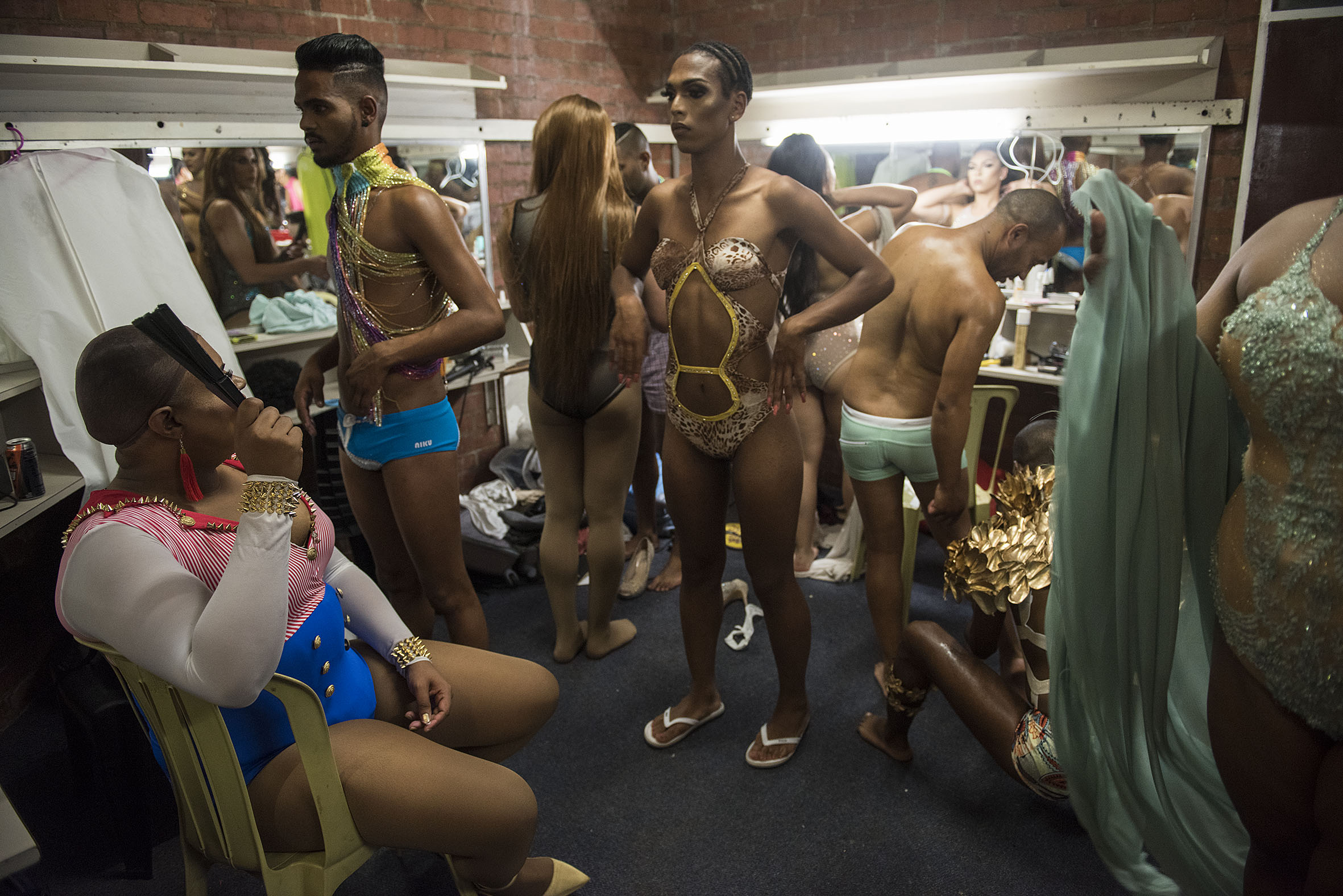
Paris Faithful has her Mamre community’s support. Photo: David Harrison.
“In Mamre, people know [I drag]. They are really excited. As ek loop, dan sê die mense, ‘Hello Paris’. Hulle noem nie vir my op my regte naam nie. So, ja … Hulle is supportive, om so te sê, ja [When I walk, the people say, ‘Hello Paris.’ They don’t call me by my real name. So yes … You could say they’re supportive, yes],” she smiles.
About entering her first pageant, she says: “I was super-nervous. But when I got dressed up and made up, I felt like, ‘Wow, is this really me?’ I fell in love with myself for just being who I am, verstaan?”
For years, drag has offered queer men — and, to a much lesser extent, women — a means of expression. In the Western Cape, arguably South Africa’s drag hub, few areas are as associated with the artform as District Six.
Now 80 years old, Gaseroen “Sammy” Samuels recalls how, in the 1960s and 1970s, he was “a wardrobe mistress” for friends and acquaintances who participated in the drag shows that regularly took place then.
“I was too young and stupidly in love to enter the contests,” he laughs. “My boyfriends then were very jealous. You know mos how men can get.”
Samuels concedes, however, that he would occasionally entertain the crowds with “some harem dancing, maar dan sê die mense vir my, ‘Jy’s al weer kaalgat. Jy hou van kaalgat wees’ [You’re naked again. You like being naked].”
Popular venues for the shows, Samuels says, were the Star and National bioscopes. “It was fun. Always overcrowded; packed to capacity. If the gays were on stage, the people were there. All the money we raised went to charity. En die moffies was begaailik. They were full of shit.”
Today’s generation of drag queens are equally full of shit, according to Samuels. “They are so full of airs and graces,” he scoffs. “But when I speak to them, they will say, ‘Sammy, in your era, you had a good time, nê?’ Dan sê ek, ‘Ja, dit was baie lekker’. Because, yhu, it was fun.”
For Garth Arnolds, having fun is first and foremost on his list of things to do as a Mr Cape Town Pride entrant.
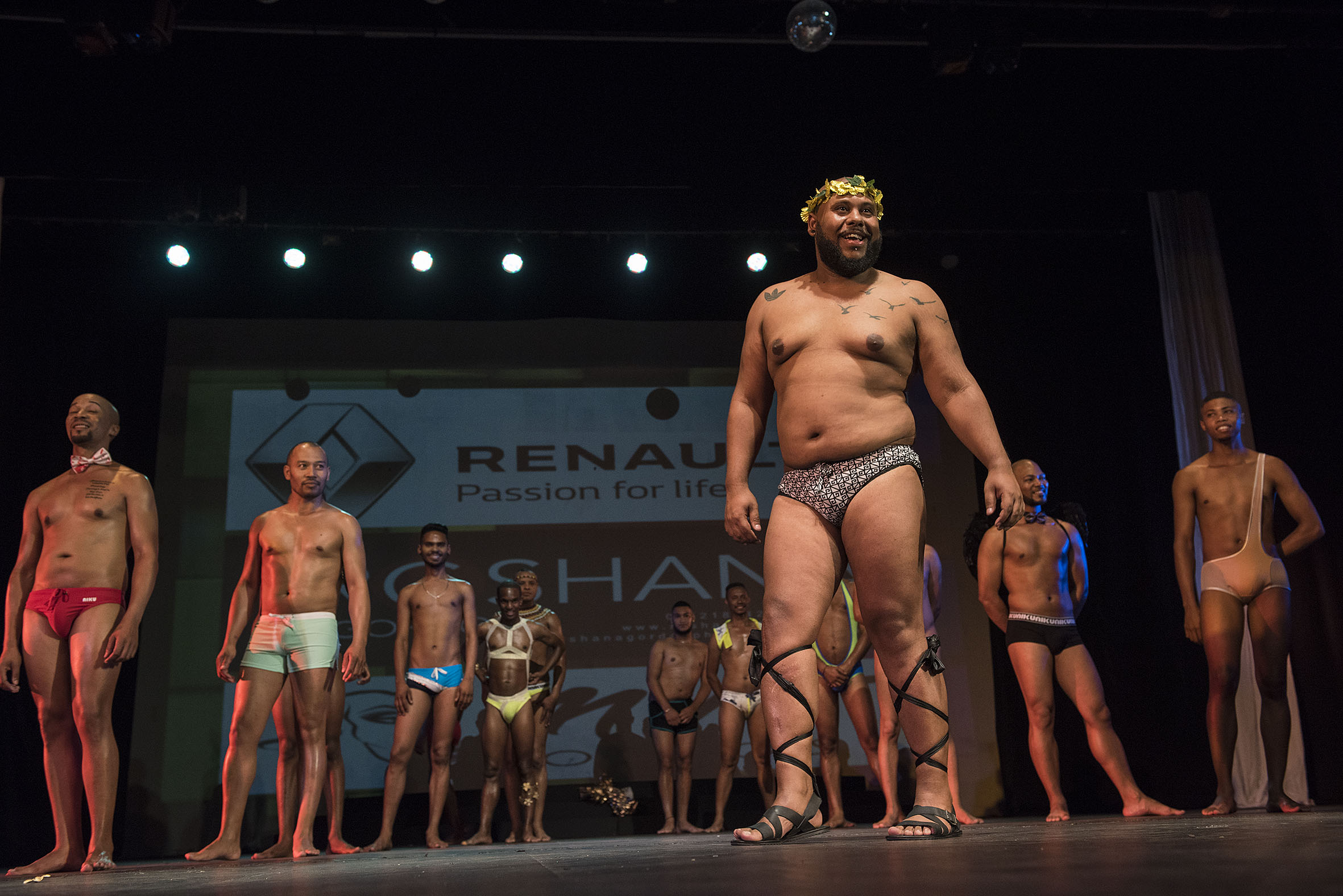
Winning way: Mr Gay Pioneer 2018 Garth Arnolds doesn’t have rolling abs but that’s not a criteria in Mr & Ms Cape Town Pride. Photo: David Harrison
Introducing himself to me in the comparatively dull men’s dressing room — with little more than a few oiled torsos to entertain the eye — Garth laughs: “I’m the biggest one here.” The 31-year-old would, by ordinary pageant standards, be considered “plus-sized”. The need to present a chiselled physique is, however, something the Mitchells Plain resident dismisses with a good-natured laugh.
“For me, it’s about being myself. You know, enjoying the moment and not thinking too much about what other people think about me. That was my whole thing: I was just gonna do it; I don’t care about what you think I should look like. I’m just gonna be me and have fun.”
This being his second foray into the world of pageantry, after clinching last year’s Mr Gay Pioneer, held in Bellville South, Arnolds adds: “I don’t care about [what] people think a winner should look like. I am a winner already — within myself.”
Carrying the Mr Gay Pioneer title, he says, comes with having to do charity work. For this, he has roped in his colleagues at the airline he works for.
“I have great people I work with who are very active with all of this as well. We are planning an event where we are going to be going to an old-age home in Mitchell’s Plain and doing a whole spa day for the ladies and gents. You know, get them groomed up and their make-up done. And after that, just have a little lunch for them. Because we forget about them, the senior citizens. But those are the people that fought for us; that were there for us.”
Minutes before the sold-out show is due to start, the building’s foyer is packed with people who are there to support the entrants. And what the building’s interior might lack in the necessary glamour, the patrons more than make up for: clutch-bag finery mingles seamlessly with sneakered boys in hot pants and oompies and anties in their Sunday best there “for support”. The smell of samoosas and mince pies from a smiling, if somewhat out-of-breath Rihana, adds a homely feel to all the pre-show posturing.
Backstage, a mic’d up Mark Donough, the pageant director, snaps affectionately: “Kom meisies, julle moet nou klaar maak, hoor? Maak klaar met rook, julle [C’mon girls, you have to finish up now, ok? Finish smoking now, you lot].’ ”
At the command, flip-flops are hurriedly swapped for towering heels, wigs are pinned to swirlkouse (pantyhose head caps) and the girls are ready. In the packed auditorium, the anticipation is palpable. When the countdown begins, to the sounds of Robin S’s Show Me Love, the crowd applauds hysterically for, well, nothing, except hearing the cheesy remix of the much-loved queer dance anthem.
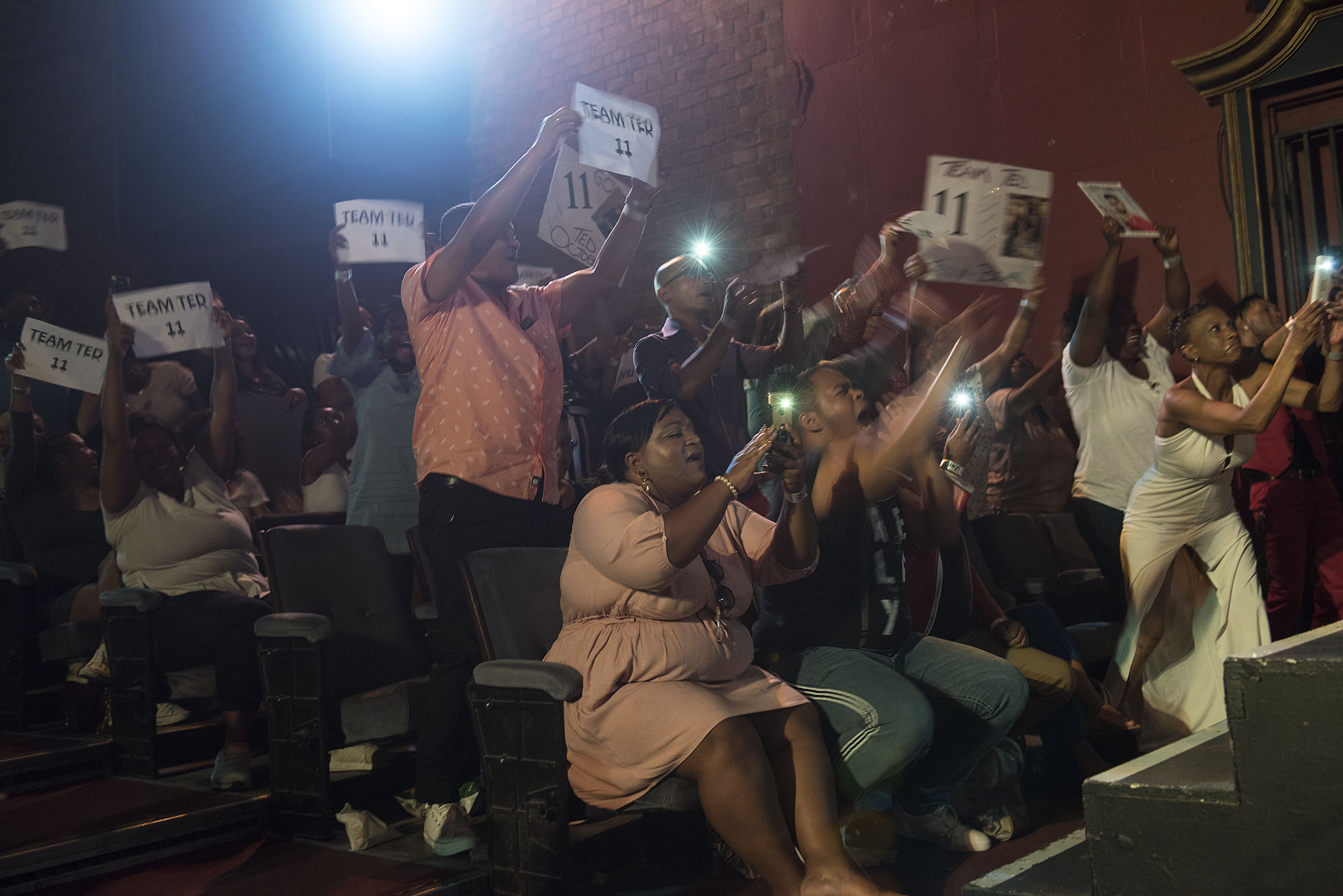
Slayed: People cheer on their Mr & Ms Cape Town Pride entrants. Photo: David Harrison
As the girls take turns swinging about on stage, lapping up the screams of appreciation and strutting as though disciplining those impossibly high heels, Skyler’s words back in the now-empty dressing room crept up on me.
“The negativity that comes with drag affects one. I was introvert. I couldn’t express myself. At work, even though I was supposed to be in meetings and stuff, I withheld so much of myself until, one year-end function, I went in drag. And everyone was so amazed. You know the feeling I got, the welcome I got, was so overwhelming.
“I had this fear that I had to disguise myself but now everybody accepts me for who I am and that makes me feel comfortable with who I am. I used to hide the truth about who I really am. Now I am just going out there, just being myself regardless of whether I am in drag or not. But I am who I am when I am in drag, because it just gives me that sense that I can just be myself. You know: really, really be myself.”
Carl Collison is the Other Foundation’s Rainbow Fellow at the Mail & Guardian
